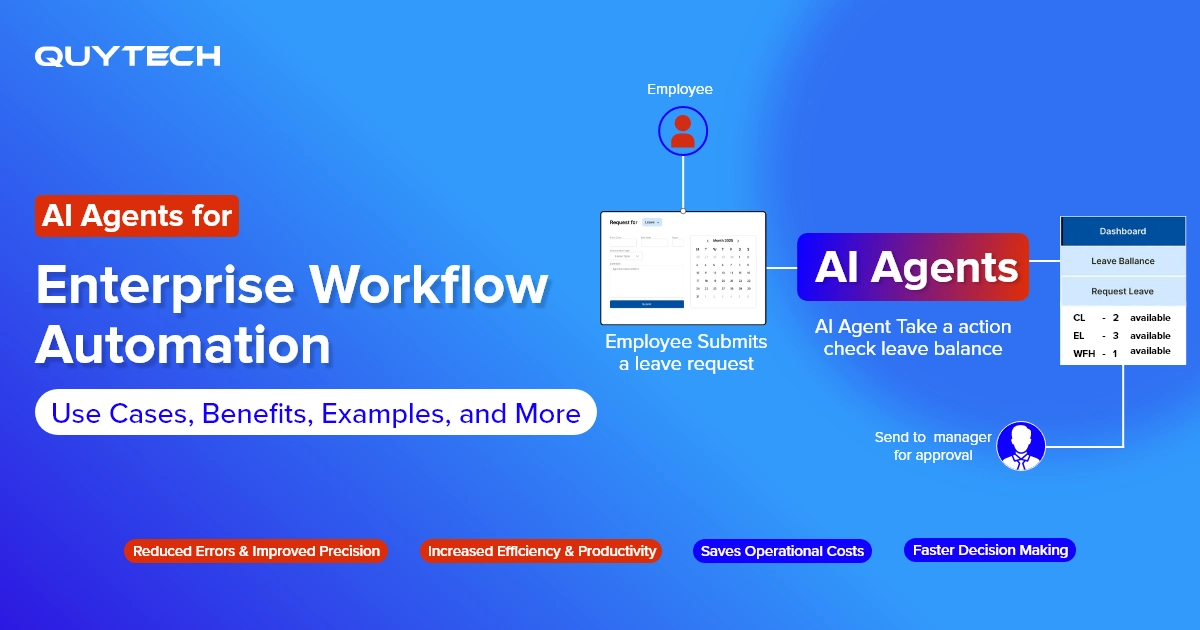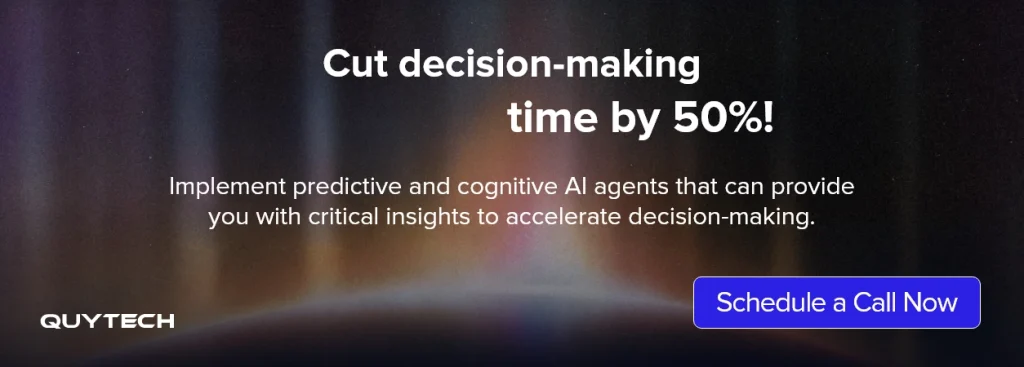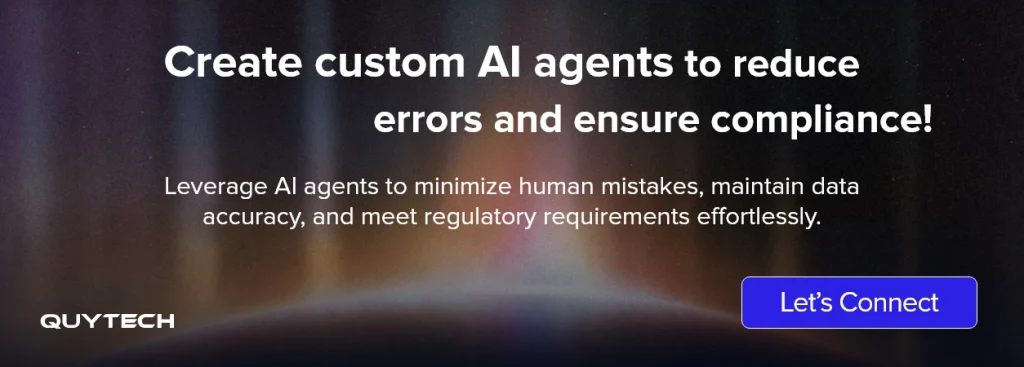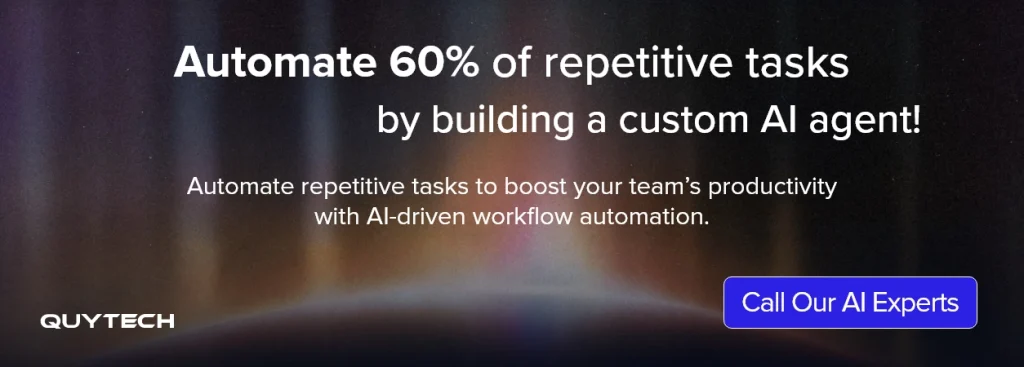Teams spending hours chasing approvals, feeding single data into multiple systems, and following up with departments on task updates is quite a common scenario in an enterprise. A study conducted by Asana on 10,000 global employees reveals that 60% of an employee’s time is spent on work-related tasks, not on the actual work.
While these problems may seem small or obvious because every enterprise has to go through them, manual workflow management can impact your bottom line and, of course, employee satisfaction and customer experience.
That’s perhaps why 88% of the enterprises have shown their keenness towards building AI agents for enterprise workflow automation. AI agents don’t just automate workflows; they bring intelligence and adapt automatically to evolving enterprise requirements.
To many, AI in an enterprise might seem similar to Agentic AI in an enterprise. However, the former is mainly used for insights and data-driven decision-making, whereas the latter acts autonomously on those insights to automate tasks and ensure end-to-end workflow automation.
Let’s dig deeper into this blog that explains everything about AI agents for organizations. From benefits, use cases, industry-specific applications, and real–world examples to types of agents that transform enterprises and a stepwise process to build a custom one, the blog covers it all.
Key Insights
- AI agents for enterprise workflow automation blend automation and human-like reasoning to automate repetitive and time-consuming tasks.
- The benefits of agentic AI in enterprise are improved operational efficiency, agility, and resilience, reduced overall operational costs, and smarter workflows.
- Rule-based, conversational, collaborative, predictive, and cognitive are some types of AI agents for enterprises.
- Agentic AI in enterprises overcomes challenges like fragmented systems, decision delays, siloed data, and others.
- AI workflow automation can be implemented in HR, sales, marketing, finance, accounting, supply chain, and other processes.
- Agentic AI in enterprises can transform retail, e-commerce, healthcare, telecommunications, and other industries.
What are AI Agents for an Enterprise
AI agents or artificial intelligence agents autonomously manage and execute operations or workflows within an organization. Like traditional AI systems, agents don’t follow any rules that have been defined during development. Instead of this, AI agents in an enterprise are smart virtual assistants capable of understanding the context and making decisions without manual intervention.
By implementing an artificial intelligence-powered agent, a large organization can ensure dynamic and self-optimizing workflows. Before you implement AI agents for enterprise workflow automation, take a look at their key characteristics:
- Rely on LLMs for Reasoning: AI agents use LLMs to comprehend the structure of the data and its context. With LLM as its building block, an agent plans the next sequence of steps, tools to be used for further analysis, and reaches out to other artificial intelligence agents.
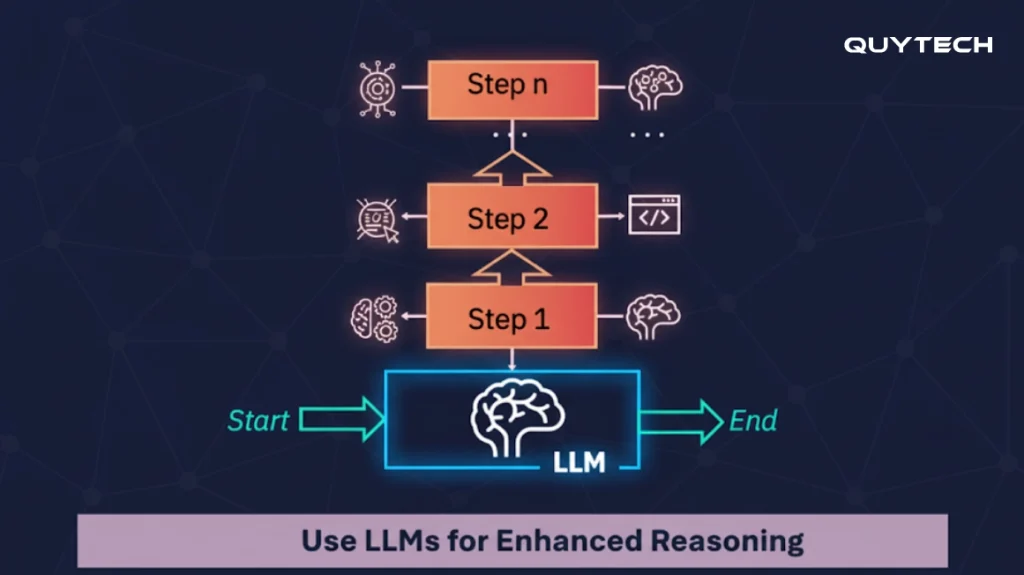
- Custom Configuration and Control: AI agents in the enterprise can be configured as per custom needs. For example, an organization can use them to make decisions independently or make it work under human supervision. It totally depends on the workflow complexity.
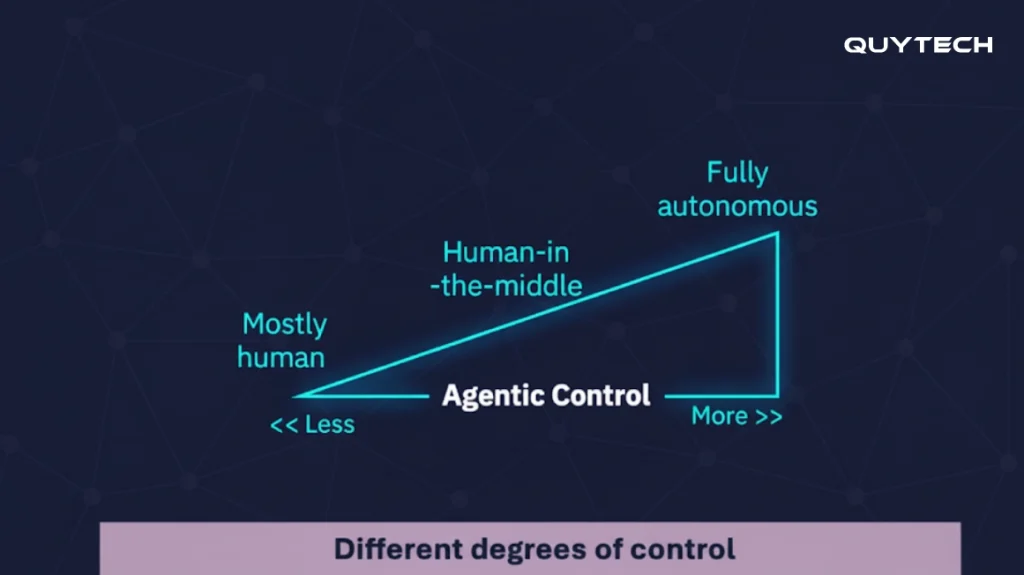
- Cognitive Architecture: Agentic AI in enterprise comes with multi-architectural patterns. An organization can build multiple single agents to perform various operations. It can then connect all single agents to make them work together, creating a multi-agent architecture.
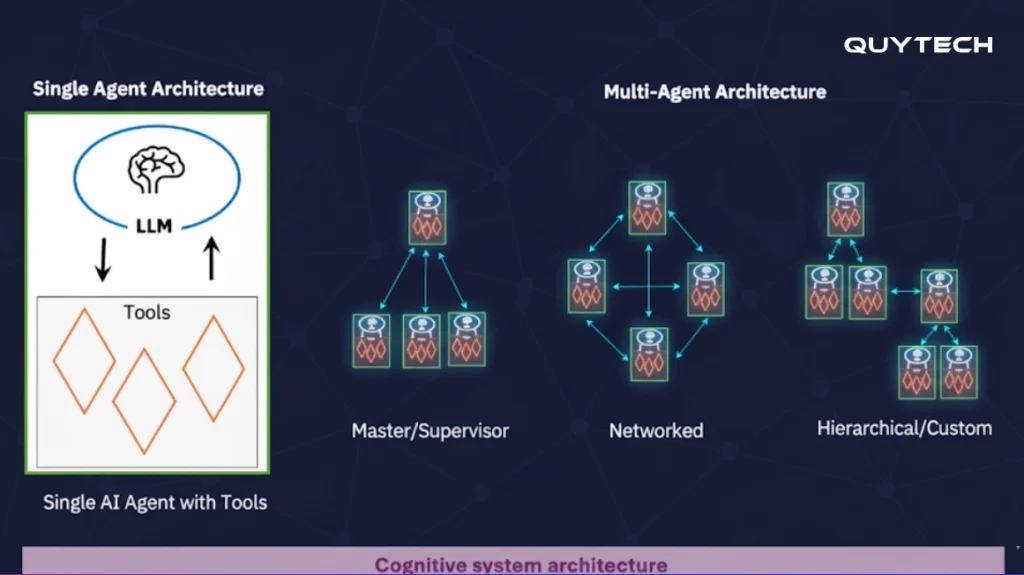
Types of AI Agents that can Transform Enterprise Workflow Automation
Enterprises have complex workflows; when it comes to AI agents, one-size-fits-all no longer works for them. Therefore, here we are going to mention different types of enterprise AI agents that can transform workflow automation like never before. For easy understanding, we have mentioned the enterprise AI agents types in a tabular form with examples:
| Type of AI Agents for Enterprise | What it Does | Example |
| Conversational AI Agents | A conversational AI agent relies on natural language processing to facilitate seamless interaction with employees/customers. These AI agents can be used for support services to answer queries and perform different operations in chat or voice. | Human resource chatbots that enable HR professionals to automate the processing of leave requests are one example of an enterprise AI agent. |
| Collaborative AI Agents | A collaborative AI agent for enterprise workflow automation works together with human professionals and collaborates seamlessly with other AI-powered systems of the organization. They can efficiently share tasks and offer insights to ramp up the productivity of employees.. | The popular GitHub Copilot that auto-suggests developers with code completion for faster writing of code is a perfect example of collaborative this type of AI workflow automation for enterprises. |
| Rule-Based AI Agents | As its name clearly suggests, a rule-based enterprise AI agent is an agent that automates workflows, considering the conditions and logics that are already defined. It works perfectly in a scenario where the least intelligence is required and only repetitive tasks with a fixed workflow need to be followed.. | You can take an expense approval system as an example of this type of AI workflow automation for big companies. |
| Predictive AI Agents | A predictive AI agent can efficiently work on historical and real-time data to make predictions. Now these predictions can bring insights about the potential risks or outcomes and future market trends. | An AI agent that predicts sales opportunities to enable sales managers to build proactive strategies is a predictive AI agent. |
| Adaptive AI Agents | Adaptive AI agents in an enterprise automatically and regularly learn and evolve from new data. Based on the tasks they have been assigned to perform, the data could be customer data, employee performance data, or any other workflow. These agents are highly dynamic. | Dynamic pricing agents that e-commerce companies use to adjust products/services’ pricing are an example of adaptive enterprise AI agents. |
| Robotic Process Automation (RPA) Agents | RPA AI agents for enterprise workflow automation are also a kind of rule-based agents that automate rule-based and repetitive tasks across different areas or departments within an organization. | An agent that automatically performs the tasks associated with invoice processing or payroll management is an RPA agent. |
| Cognitive AI Agents | An enterprise can deploy cognitive AI agents to get human-like reasoning capabilities within an intelligent assistant. These agents can reason by blending perception, learning, and decision-making for highly complex tasks that otherwise consume significant time and resources. | An agent that empowers healthcare professionals in diagnosing diseases based on the patient’s medical history and symptoms is a cognitive AI agent. |
Similar Read: AI Agents Vs. Traditional Automation: A Detailed Comparison
What Enterprise Workflow Challenges AI Agents Overcome
Before you implement an AI agent or build a custom one for your enterprise workflow automation, it is important to understand its capabilities. Therefore, we have thoroughly mentioned the challenges that impact an enterprise’s productivity, customer and employee experience, and the bottom line. Thankfully, an AI agent for workflow automation can address them all. Let’s understand how:
- Manual and Repetitive Processes
Big companies often have complex tasks that they need to perform on a regular basis. For example, they need to enter specific data, get approvals on it from different teams/managers, generate reports, etc. These repetitive tasks are heavily dependent on manual resources and keep them occupied for longer periods of time.
AI agents bring intelligent automation to these operations and enable employees to focus on tasks with higher value.
Explore More: How AI Agents are Redefining Enterprise Productivity
- Fragmented Systems and Siloed Data
Another major challenge that most enterprises face, and AI workflow automation can address, is that big organizations often have several departments that use different software or solutions. The seamless collaboration of these software is necessary for a smoother flow of data and information, to avoid delays, and prevent employees from doing redundant work.
Agentic AI in enterprise workflow automation can be integrated into multiple departments. These agents can fill this gap and act as a bridge connecting different software and tools for smooth workflow automation and data transfer.
- Delays in Decision-Making
Organizations performing tasks or different operations manually may not be able to respond quickly or bring faster and accurate insights. This may delay the report generation that most managers rely on to make decisions.
An agent designed specifically for automating enterprise workflows can quickly process data to offer actionable insights and empower managers to make decisions without any delay.
- Inconsistent Process Execution
Another major challenge that can be resolved with AI workflow automation is that different professionals working on the same task may not deliver the same output in terms of task management, accuracy in execution, adherence to compliance, and other aspects. This makes the whole process execution inconsistent.
An AI agent for enterprise workflow automation and management follows defined rules and is also capable of making learning-based decisions to ensure consistency and accuracy in process execution.
Critical Insights: How Enterprise AI Agents Are Redefining Business Processes
- Scalability Challenges
As large organizations, operations can become highly complex. In traditional settings, the organization would definitely need additional resources to keep up the pace or meet evolving needs.
AI agents for enterprises can scale effortlessly to handle increasing volumes of operations and data complexity. The best part is that neither quality nor speed is compromised.
- Employee Burnout and Low Productivity
Enterprises with no way for task automation require their employees to perform the same type of task every day. This may make the personnel feel frustrated and less productive. Such repetitive tasks may make them feel less productive and valued, sometimes.
Agentic AI in enterprises automates such tasks to reduce the burden on employees. It allows them to work on creative and decision-making tasks that make them feel valued.
- High Operational Costs
Time and resources consumed to perform tasks, especially the repetitive ones, increase the overall cost of performing tasks. It also impacts operational efficiency.
Artificial intelligence agents reduce operational costs with automation. They improve operational efficiency, which further enables managers to optimally allocate resources.
- Limited Workflow Visibility and Insights
Conventional ways of performing tasks might not facilitate regular monitoring of tasks to pinpoint bottlenecks or find inefficiencies. Companies may also struggle in finding the areas that need improvement.
AI agents, when used for enterprise workflow automation, can automatically track workflows in real-time. They can provide analytics and insights for the optimization of processes and understand key areas that require improvement.
AI Agents for Enterprise Workflow Automation: Key Areas it Transforms
Now comes the most important section, i.e., the use cases of AI agents in enterprise workflow automation. You can also read this as “how AI agents transform enterprise workflows” or “key areas where these intelligent agents can bring transformation”.
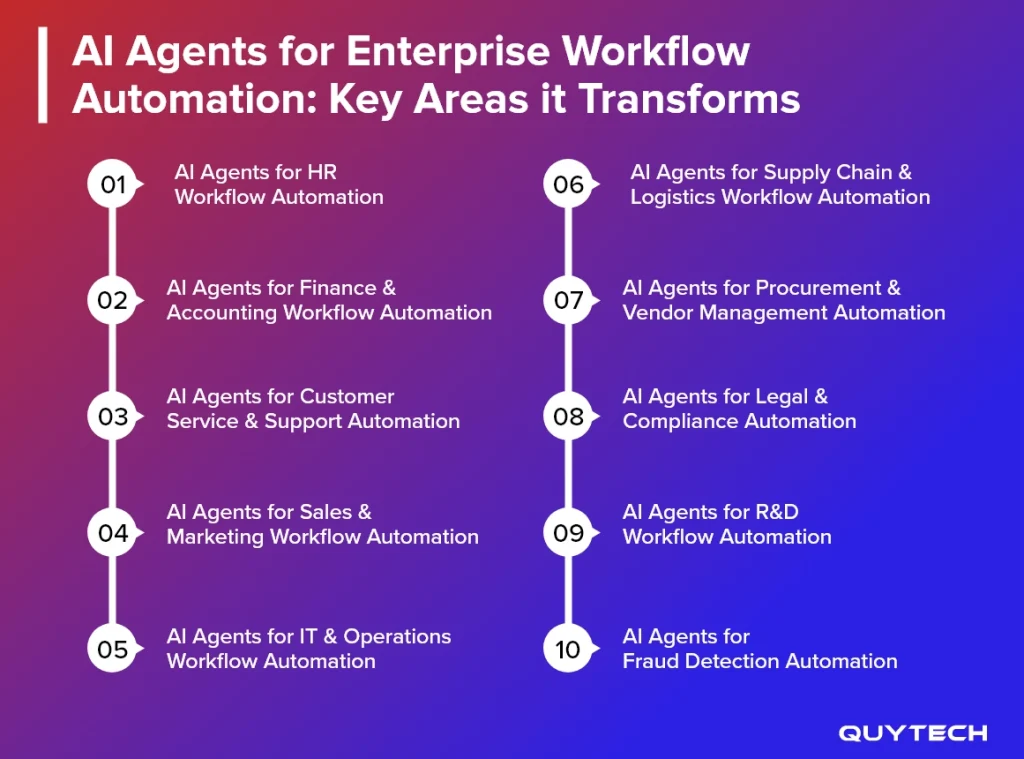
1. AI Agents for HR Workflow Automation
Human resource departments in large organizations perform onboarding, payroll, leave management, and employee management manually. This requires significant time and keeps most resources occupied.
AI agents, particularly conversational AI agents, can efficiently handle HR tasks, such as auto-respoding to employee queries and navigating those that require human attention. They can automate onboarding-related tasks and process leave management requests. HR professionals can get time to make critical decisions or build strategies for talent management.
Keep Reading: AI in Human Resources: Streamlining Paperwork to Personnel Management
2. AI Agents for Finance and Accounting Workflow Automation
Finance and accounting tasks like manual invoice processing, expense reconciliation, and others may drain the productivity of finance professionals. Besides, they may not always guarantee adherence to compliance and accuracy, which is non-negotiable for organizations.
Rule-based and predictive AI agents can transform the entire finance and accounting tasks management process by automating these tasks. They can even detect anomalies to lower the chances of errors and maintain the required speed in task execution.
Continue Reading: AI Agents in Finance: Use Cases, Benefits, Challenges and More
3. AI Agents for Customer Service & Support Automation
The next amazing use case of AI agents in enterprise workflow automation is in customer service and support. Manually handling and processing high volumes of customer queries or tickets is not feasible, as it will need significant time, which customers (such as those who just want a simple piece of information) may not like. The slow response time will directly impact customer satisfaction and an enterprise’s image.
Conversional and adaptive AI agents can work wonders to transform an enterprise’s customer support and services. These agents are capable of answering simple queries to handling complex issues and even navigating them if manual assistance or guidance is required. This workflow automation in an enterprise improves service quality and speed.
Delve Deeper: AI Agents in Customer Service: Benefits, Use Cases, Real-World Examples, and More
4. AI Agents for Sales and Marketing Workflow Automation
Sales and marketing are the two crucial departments for almost every enterprise. The professionals in these departments have to perform tasks like sorting leads to decide their priority and relevance, follow up with potential customers, generate reports of campaigns, etc. Now, imagine how much time and effort would be required to perform these tasks manually.
Predictive and collaborative AI agents for enterprise workflow automation are capable of auto-analyzing customer data and sorting and prioritizing leads. They can even help with designing targeted marketing campaigns that can turn potential customers into clients.
Read in detail: AI Agents in Sales: Types, Benefits, Stats, Use Cases, Features, and More
5. AI Agents for IT and Operations Workflow Automation
In information technology and operations management, the teams may need to perform various operations, such as monitoring the system and ensuring its timely maintenance. Keep a track of those tasks, and performing them manually is time-consuming.
RPA and cognitive AI agents can work amazingly as they free human professionals from manual monitoring and addressing simple problems. They can also keep track of system maintenance and raise an alert or even schedule the same without manual intervention.
6. AI Agents for Supply Chain and Logistics Workflow Automation
Supply chain and logistics management is one of the most important areas in an enterprise. The operations, such as shipment tracking, order dispatch, inventory management, route planning, and demand forecasting, involved in this department are not only complex but are time-sensitive.
Predictive and adaptive AI agents for enterprise workflow automation can streamline these processes with end-to-end automation. The agents can optimize inventory and predict inventory demand. They can even automate tracking of orders.
Unlock Insights: AI in Supply Chain Management: Navigating the Future of Logistics
7. AI Agents for Procurement and Vendor Management Automation
Big enterprises deal with hundreds of vendors. Whenever a new vendor is onboarded, the dedicated teams have to review documents and perform other repetitive onboarding tasks manually. This consumes a lot of time and impacts employees’ productivity without guaranteeing efficient procurement and vendor management.
Rule-based and cognitive AI agents act as a knight in shining armour and automate workflows or operations associated with procurement and vendor management. The agents can monitor vendor performance, process their invoices, and even verify compliance with signed contracts.
8. AI Agents for Legal and Compliance Automation
The main challenges enterprises face with legal and compliance management are manually reviewing documents, monitoring compliance with defined regulations and laws, and managing contracts. Even a single error or slight delay can invite penalties and impact an enterprise’s reputation.
Cognitive AI agents automatically review these contracts to identify if there is any compliance risk. They can also track regulatory changes to ensure the company adheres to them. The agents minimize legal workload and also eliminate the risks that may lead to fines.
Learn More: Role of Artificial Intelligence in Legal Firms: Enhancing Efficiency and Accuracy
9. AI Agents for R&D Workflow Automation
The research and development segment of an enterprise deals with critical data collection. This data is then used to conduct and track experiments. Imagine how much time it would take if all this process were done manually. Apart from the time, effort, and cost associated with R&D tasks is also high.
Predictive and adaptive AI agents automate R&D workflows to collect and analyze data. These agents can even autonomously summarize research findings to extract insights. Based on the insights received, R&D professionals can speed up innovation cycles.
10. AI Agents for Fraud Detection Automation
Enterprises deal with high volumes of customer data, which is sensitive and can be the target of cybercriminals. Implementing robust security techniques definitely gives protection and security to this data to some extent, but for advanced threat protection, the approach has to be proactive rather than reactive.
Predictive and cognitive AI agents can analyze transactions and suspicious activities in real-time to predict the chances of risks associated with the data. They can even detect highly complex fraud attempts.
Find Out More: How AI is Transforming Fraud Detection in Digital Transactions
Apart from these, enterprises can build the following types of agents to redefine workflows:
- Recruitment agents
- Calling agents
- Stock agents
- Marketing agents
- Compliance monitoring
Deciding which agent to build depends on the areas that need transformation with automation and intelligence. You can reach out to a reputable and trusted AI agent development company to find which type of AI agent would suit your business needs.
However, if you want to build an AI agent, read our other blog that includes a stepwise process:
How to Build an AI Agent? Top Use Cases, Benefits, and Examples
Example of an Enterprise Workflow Automation Done with AI Agents
Now that you know the use cases of enterprise workflow automation powered by AI agents, let’s take a look at this example of an invoice processing automation to understand how these agents actually work:
Invoice processing in a large enterprise requires professionals to process hundreds of invoices received from different vendors. The team manually verifies each invoice, ensures there are no duplicate invoices, and matches their amount with purchase orders. Once all this is validated, the team sends it to the managers for their approval.
Now, see the intelligence and automation that an AI agent brings!
- By using OCR (optical character recognition) and NLP (natural language processing), the AI agents process invoices. They extract information such as the name of the vendor, date, amount, and items.
- It verifies the data against its respective purchase order or contract to ensure there are no errors or duplications.
- If everything is correct, the agents automatically share the invoices with the dedicated manager or person for approval.
- Once approved, AI agents for an enterprise initiate payment processing while generating real-time reports.
Impact
This example of an AI agent in enterprise workflow automation clearly shows:
- The automation reduced invoice processing time to improve operational efficiency.
- These agents eliminate the chances of duplicate entries and, hence, payments.
- The workflow automation doesn’t need anyone to perform invoice processing-related tasks manually. This amplifies productivity.
- These agents track invoices in real-time. It provides critical cash flow insights while improving transparency.
You may want to read: A Comprehensive Guide to AI Agents for Wealth Management
Industry-Specific Use Cases of AI Agents for Enterprise Workflow Automation
Let’s briefly understand how enterprises from different industries can utilize Agentic AI for workflow automation:
Banking & Financial Services
The most common AI agents that banks and financial institutions can use are cognitive and predictive AI agents. They can detect fraud and monitor compliance.
Explore More: Agentic AI For Financial Advisors: Use Cases, Benefits, and More
Healthcare
The healthcare sector can use conversational and predictive AI agents for patient onboarding, claims processing, disease diagnosis, and in other workflows.
Retail & E-Commerce
AI agents, like predictive and conversational, can transform various aspects of the e-commerce and retail industries. These agents can automate inventory management. Retail businesses can also use AI agents to streamline customer support and other workflows.
Explore Insights: AI Agents in E-Commerce: Everything You Need to Know
Manufacturing and Supply Chain
Enterprises from these two industries can make the most of predictive, RPA, and adaptive AI agents to optimize workflows for predictive maintenance with predictive analytics, order fulfillment, and others.
Delve Deeper: AI Agents in Manufacturing: A New Era of Excellence
Telecommunications
Agentic AI in enterprises from telecommunications can rely on cognitive AI agents and conversational AI agents for efficient and automated network monitoring and customer service support.
Insurance
Enterprises from the insurance industry can utilize cognitive, rule-based, and predictive AI agents to automate various aspects, including policy processing, insurance claims, and others.
You might be interested in: AI Agents vs. AI Chatbots: In-Depth Comparison Guide
Benefits of AI Workflow Automation in an Enterprise
AI workflow automation in an enterprise can increase efficiency and employee productivity, minimize the chances of errors, and ensure high-level accuracy in the tasks. Read on to know these benefits of Agentic AI in enterprise automation in detail:
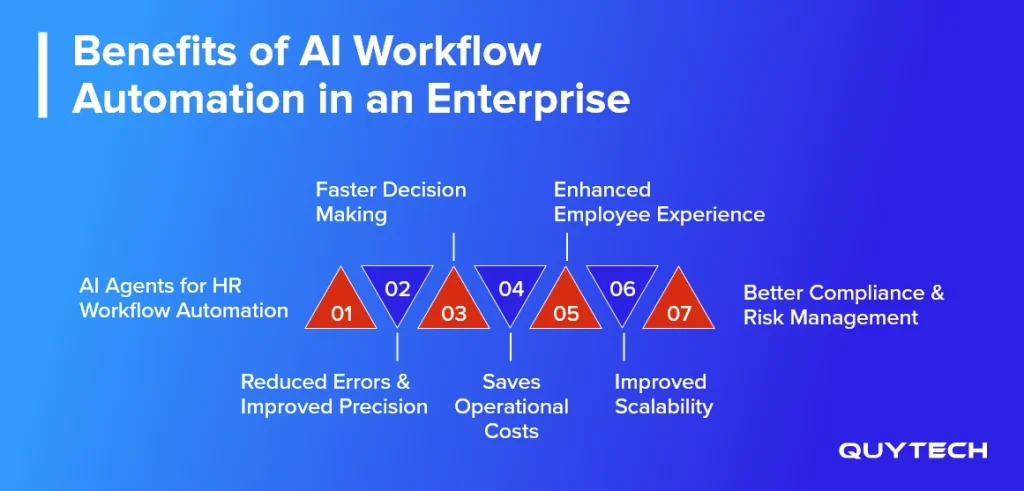
- Increased Efficiency and Productivity
By handling and streamlining automating tasks, AI agents in enterprise workflows improve operational efficiency. The employees no longer have to spend hours or even days working on a task that an agent can perform flawlessly in minutes. The employees can focus on higher-value work where human supervision, guidance, or contribution is essential.
- Reduced Errors and Improved Precision
Another amazing advantage of Agentic AI in the enterprise is that it reduces the chances of mistakes that are there when workflows are managed manually. AI agents consistently follow rules and make learning-based decisions accurately to avoid errors and generate high-quality results.
- Faster Decision Making
Automation brought by AI agents enables managers to make data-backed decisions. In some scenarios, managers don’t even need to make these decisions. The agent autonomously acts or makes decisions if the pre-defined conditions are met.
Read in Detail: Agentic AI for Decision-Making: Embracing Autonomous Intelligence
- Saves Operational Costs
Automation saves a lot of time; it also accelerates decision-making and ensures resources are allocated efficiently. This reduces the overall cost of running operations, whether it is sales, marketing, legal, or any other.
- Enhanced Employee Experience
An enterprise assigning employees to do high-value tasks improves their morale and makes them feel valued. AI agents free the employees to perform mundane tasks, which can lead to burnout and dissatisfaction.
- Improved Scalability
AI agents for enterprise workflow automation can work efficiently even if the data or business evolves or grows. These virtual assistants are dynamic and can easily adapt to new workflows, data, and departments.
- Better Compliance and Risk Management
AI agents can ensure that every process or operation strictly adheres to compliance. When an enterprise chooses the relevant use case and builds the right AI agent, it can even ensure audit-readiness and adherence to regulations.
Take a look: Top 10 AI Agents in 2025 to Automate Workflows
Leading Organizations Using AI Agents for Enterprise Workflow Automation
Many leading companies are already using agentic AI in the enterprise for workflow automation. Three most popular examples are:
- Citigroup
The company uses advanced AI agents to redefine its internal complex operations and perform multiple tasks with one prompt. The agents can simultaneously process data from over 5000 users to understand impact and usage patterns. Based on the analysis, these agents deliver critical insights for decision-making.
- Microsoft
The world-renowned company has integrated AI agents in many of its products. These advanced agents automate various tasks, such as scheduling a meeting, organizing files, and others. It saves time and improves productivity.
- Uber
Uber is another worldwide recognized enterprise that has integrated artificial intelligence agents into their customer service platform. These agents can efficiently handle thousands of customer queries and deliver context-aware assistance.
Future of Agentic AI in Enterprise Workflow Automation
AI agents are increasingly making a permanent place in most enterprises. This shows its future is quite promising. In 2026 and the upcoming years, we may witness:
- End-to-end workflow management without manual intervention
- The rise of generative AI and LLMs to enhance the agent’s reasoning and problem-solving capabilities.
- Hyper-personalization may also become the next big strength of AI agents for enterprises.
- In the future, we may see predictive and prescription automation to make enterprises agile and highly resilient.
- We may also witness AI agents not only collaborating across departments but also across enterprises.
Build a Custom AI Agent for Enterprise Workflow Automation with Quytech
Quytech is a leading AI agent development company with experience in developing and deploying 100+ AI agents dedicatedly to enterprises. These intelligent and autonomous agents deliver tangible impact while reducing errors, accelerating the pace of performing tasks, independently making decisions, and improving employee productivity and satisfaction.
From HR, marketing, and sales to operations and IT, we can build advanced-level agents to transform almost every area of your enterprise. Customization, end-to-end implementation, seamless integration of AI agents with existing systems, in-depth agentic AI expertise, and reliable support are a few USPs of our company.
Final Words
AI agents in enterprise workflow automation automate critical business operations and departments, including sales, human resources, marketing, IT, and supply chain management. With automation brought by smart agents, employees in an organization can focus on strategic initiatives.
This blogs delve deeper into agentic AI in enterprise, including its use cases, benefits, industry-specific applications, and working. If you are interested in building a custom AI agent that can transform your enterprise operations and workflows, reach out to an experienced AI agent development company.
FAQs
AI agents analyze data, make decisions, and coordinate and collaborate with departments to automate workflows.
Yes. For this, you need to deploy cognitive AI agents that can automatically learn from past interactions and feedback to improve outcomes and performance.
Here is the step-by-step working of an AI agent for an enterprise workflow automation:
– Data collection and analysis
– Decision making
– Task execution
– Learning and adaptation
It depends on the tasks you want to perform or the department where you want to implement the AI agent. For example, rule-based AI agents are best for simple tasks, predictive agents for forecasting tasks, and so on.
For this, you need to define KPIs (error reduction, productivity improvement, cost saving, etc.) against which you will evaluate the performance and effectiveness of your AI agent.
The cost of building AI agents in an enterprise depends on the complexity of workflows, system integrations required, AI models’ sophistication, and scalability requirements.
